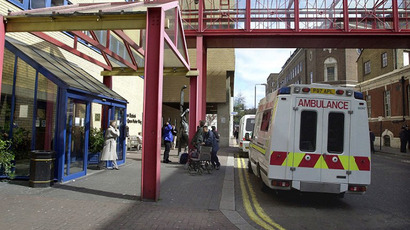British MPs raise alarm over drug trials, say only half data published

British MPs have voiced concern that doctors and researchers are being denied access to around half the results from all clinical trials. An influential parliamentary committee has condemned the selectiveness as damaging medicine as a whole.
This apparently standard practice of withholding critical medical test information impairs decision-making by professionals, worsens patients’ treatment and prevents independent assessment of medicines, the MPs wrote. And the practice, they say, dates back all the way to the 1980s.
In the report, the MPs write that they are “surprised and concerned to discover that information is routinely withheld from doctors and researchers about the methods and results of clinical trials on treatments currently prescribed in the United Kingdom. This problem has been noted for many years in the professional academic literature, with many promises given, but without adequate action being taken by government, industry or professional bodies.”
“This has ramifications for the whole of medicine. The ability of doctors, researchers and patients to make informed decisions about treatments is being undermined,” said Richard Bacon, a senior member on the committee that published the report.
The MPs argue that this is a great problem also because the issue of access to clinical trials from previous years is absent from all new proposals. And test results on humans provide researchers with key evidence to support or oppose the use of a given medicine. There are unprecedented dangers when this framework is not operating as intended, they said.

Compounding the problem further, MPs say, is that aside from the non-publication of all clinical trial tests, for some reason positive results started popping up twice as much as negative ones. This is bad when all trial results on all uses of all chemicals should be provided, the report argues.
As a result, the committee’s MPs have given strong recommendations to the government and the country’s health bodies – among them, firstly, that the full results of clinical trials from now on be disseminated to all doctors and researchers in the UK, with full audits carried out regularly to check for transgressions; and secondly, that the Department of Health and the Medicines and Healthcare products Regulatory Agency (MHRA) ensure that all past and future trial results and the methods used to achieve them be published in a unified register for further use.
Bacon expressed alarm that the absence of past results invariably impact doctors’ decisions on treatment. “Regulators and the industry have made proposals to open up access, but these do not cover the issue of access to the results of trials in the past which bear on the efficacy and safety of medicines in use today," he said.
The worrying implication here is that so much medicine has been tested and approved over the past few decades, but only half of it we know the full truth about, it turns out.
One particular medicine that became a focus for alarm was Tamiflu – the popular flu medicine that gained popularity in 2009-10 during the great flu pandemic. Apparently, the UK Department of Health, without having access to exhaustive information on the medicine, had made a 424-million-pound decision to stockpile it between the years 2006-7 and 2012-13.
That kind of attitude, the MPs argue, is predicated on judgment, rather than real science. There is still no agreement on how the popular medicine works and disagreement on whether full information was provided to regulators by the MHRA during the licensing process. As it turns out from studies conducted by the non-profit NGO, Cochrane Collaboration, Tamiflu “did not reduce influenza-related lower respiratory tract complications.”
The organization is now in talks with Roche to receive the full details of Tamiflu’s testing, which will be included in a thorough upcoming review on its effectiveness. Both the government and the medical bodies will take part, as MPs share the think tank’s concern when it wrote that “we find it perplexing that the regulators continue to state that they had all the available evidence.”
Regarding Tamiflu and the wider practice as a whole, Bacon recommended that “before spending money in future to maintain the stockpile, the department needs to review what level of coverage is appropriate. It should look at the level of stockpiling in other countries, bearing in mind that the patent for the medicine runs out in 2016."














